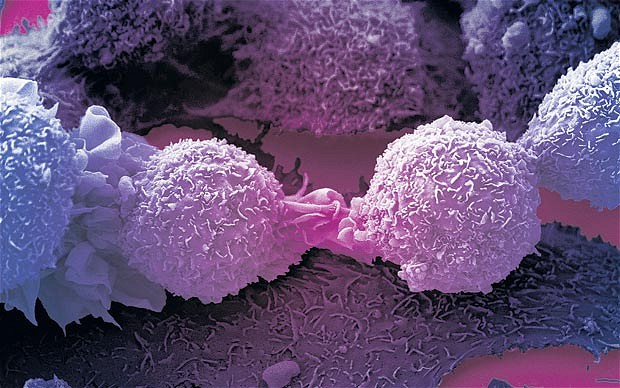Up to nine in 10 cancers are caused by environmental and external factors such as smoking, drinking, sun exposure and air pollution, a new scientific study has found.
Previous research suggested that random cell mutations played a significant role in the development of tumours, a finding dubbed the ‘bad luck hypothesis.’ But scientists now believe that outside influences have a far greater impact, meaning many cancers may be more preventable than previously thought.
The finding is likely to prove controversial as it suggests that people could slash their risk of ever getting cancer if they just made lifestyle changes such as keeping out of the sun, exercising or cutting down on cigarettes. One British statistician said that the results showed that between 70 and 90 per cent of cancers would not occur if we could ‘magic away’ all the external risk factors.
It follows on from a study published earlier this year which suggested that 65 per cent were inevitable and driven by random mistakes in cell division which are completely outside of our control. The more times cells divide, the greater the chances that a mutation can occur, leading to cancer, Johns Hopkins University said in January, and claimed it explained why areas of the body where cell division occurred more quickly, such as the colon, were more likely to develop tumours.
However the new study, by Stony Brook University in New York, suggests that cancer incidence is far too high to be explained away by simple mutations in cell division. Put simply, if random mutations were to blame, there would be far fewer cases of cancer than there actually are.
Yusuf Hannun of Stony Brook University New York, US, said: “Here we provide evidence that intrinsic risk factors contribute only modestly to cancer development. “The rates of mutation accumulation by intrinsic processes are not sufficient to account for the observed cancer risks.” The researchers also looked at previous studies which have shown how immigrants moving from low cancer incidence to countries with high cancer incidence soon develop the same tumour rates, suggesting the risks are environmental rather than biological or genetic.
Nearly 75 per cent of the risk of colorectal cancer is now believed to be due to diet. Likewise 86 per cent of the risk of skin cancer is down to sun exposure while 75 per cent of chance of developing head and neck cancers is due to tobacco and alcohol, according the the new research.
Although some rare cancers can be driven by genetic mutations, the most prevalent diseases are down to environmental factors, they conclude. They say it is important that these ‘extrinsic’ factors are taken into account in cancer prevention and research.
The government even set up its ‘100,000 Genomes Project’ to try and find the genetic causes of many rare diseases and cancers. But the new study shows the project is unlikely to help the majority of cancer sufferers. Around 330,000 people are diagnosed with cancer each year and 161,000 will die, according to statistics from Cancer Research UK. It was previously thought that fewer than half of cancer could be prevented by lifestyle changes, but the new research suggests it could be far higher.
Prof Kevin McConway, Professor of Applied Statistics, The Open University, said research provided ‘pretty convincing evidence’ that external factors play a major role in many cancers. “For many common types of cancer, this study concludes that at least 70 per cent to 90 per cent of the cancers are due to external risk factors – roughly speaking, that 70 per cent to 90 per cent would not occur if we could magic away all the risk factors,” he said. “Even if someone is exposed to important external risk factors, of course it isn’t certain that they will develop a cancer – chance is always involved. “But this study demonstrates again that we have to look well beyond pure chance and luck to understand and protect against cancers.”
Prof Paul Pharoah, Professor of Cancer Epidemiology, University of Cambridge, said: “These findings do not have any implications for cancer treatment, but they do tell us that most cancers would be preventable if we knew all of the extrinsic risk factors that cause disease. “This is not really novel in itself, and we already know for many cancers some major avoidable risk factors. “It is important to realize that these results do not tell us anything about the absolute risks of any given cancer.
The research was published in the journal Nature.




